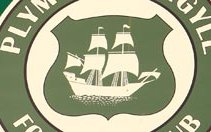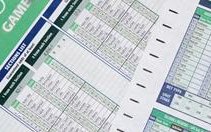The ‘Where Are They Now’ series continues with Peverell Green taking a look at the fascinating life and career of Argyle striker Jack Cock.
JACK COCK – Born 14th November 1893 Phillack, Nr.Hayle, Cornwall.
You may wonder why I am writing about a player probably no one alive has ever saw playing, I hope by the time you have finished reading his story you will understand.
He was a war hero, a full England international, a music hall performer, he appeared in films, was considered a flamboyant character and was regarded as the best dressed footballer of his day and he scored goals at an incredible rate wherever he played.
John Gilbert Cock was born in Cornwall, the third of five children to James and Eliza, his father was a trimmer, when Jack was a youngster the family moved to Fulham, presumably to do with his father’s job. He started playing football with amateur clubs in the London area, he played for West Kensington United, Forest Gate and Old Kingstonians before signing for Brentford, still as an amateur in March 1914, playing in the Southern League Division 2, he played three times for them scoring one goal.
He signed professional for Huddersfield later in 1914 but his career was abruptly halted with the outbreak of the First World War.
This is where his story really begins. He joined the 17th Middlesex Regiment, the famous ‘Footballers Battalion’ and rose to the rank of Acting Sergeant Major, he fought in the significant battles at the Somme, Arras and Cambrai.
He was awarded the Military Medal for ‘Bravery in the Field’ and was Mentioned in Despatches for his gallantry.
At one point he was reported as missing in action, presumed dead.
When he was on home leave he would turn out for both Brentford and Croydon Common. After the war ended he returned to Huddersfield, but not before he had got his international career underway.
On 22nd February 1919 he represented the Football League against the Scottish League at St.Andrews, Birmingham, with the Football League winning 3-1.
He played in the Victory International against Wales on 19th October 1919 at Victoria Ground Stoke in a 2-0 win.
He also made his full England debut in 1919, making him the first Cornishman to achieve the honour, he played against Ireland at Windsor Park, Belfast in a 1-1 draw with Jack scoring the England goal after only 90 seconds, this is still the third fastest goal scored by an England player.
Further honours came his way in 1920 when he again played for the Football League against the Scottish League at Hampden Park, Glasgow, in front of 83,000, Jack scored in a comprehensive 4-0 victory.
On 10th April he won his second England cap this time against the Scottish national team at Hillsborough, Sheffield, with Jack adding to his goal tally in a 5-4 win.
His club Huddersfield were in severe financial difficulties, things don’t change much in football do they. And in October 1919, after only 18 appearances and nine goals he was sold to Chelsea, for a then record fee of £2,500.
He made his Chelsea debut against Bradford scoring two goals, he scored another 22 in 30 league games, helping his club to a third place finish and reached the FA Cup semi-finals, in the three full seasons he spent at Stamford Bridge he was the team’s leading goalscorer in all of them.
He had a fanatical dedication to fitness, staying on to train alone long after his teammates had gone home.
Early in the 1922-23 season he was transferred to Everton. He made 110 appearances for Chelsea and scored 53 goals.
He joined Everton in February 1923. I couldn’t find much about his time at Goodison Park apart from he was there for exactly two seasons and in that time played 69 league games and scored 29 goals. Then, as now, both Chelsea and Everton were Division One teams (Premiership) so Jack’s next club probably came as a bit of a surprise in the football world.
In March 1925 the former England International and Division One player Jack Cock was signed by Argyle manager Bob Jack in what can only be described as a significant coup for the club.
He made his debut on 14th March 1925 in a 1-0 win at home to Watford with the legendary Sammy Black scoring the winner.
He scored his first goal for the club in his next game in a 5-2 away defeat at Northampton, and followed that one with two more in his next game in a 3-2 win at home to Charlton.
In his first season he played in 10 games and scored seven goals. With a forward line of Patsy Corcoran, Fred Forbes, Jack Cock, Jack Leslie and Sammy Black it’s no wonder Argyle ended up as top scorers in their division with 77 goals, unfortunately they finished up in runners up position, as they had in the previous three seasons with only one team being promoted from Division 3 South.
1925-26 started with a bang, a Jack Cock hat trick in a 6-2 opening day home win over Southend and he followed it up four days later with two goals in another 6-2 home win over Crystal Palace.
Further big victories followed throughout the season, Brentford 4-0 (H), Aberdare Athletic 7-2 (H), Bournemouth 7-2 (H), Crystal Palace 5-5 (A), Norwich 6-3 (H), Brighton 5-3 (H), Charlton 5-0 (A), Luton 4-3 (H) and QPR 4-0 (A).
In the 6-3 win over Norwich Jack scored four of the goals.
He made 36 appearances that season and scored 32 goals, including one in the FA Cup against his old club Chelsea in a narrow 2-1 defeat at Stamford Bridge. With Sammy Black scoring 19 and Jack Leslie 17 Argyle scored and incredible 107 goals, a whopping 30 more than champions Reading, it was, and still is the most goals the club has scored in a season. Argyle again finished in runners up spot.
Jack started the next season in the same way he had finished the last, scoring in the first three games of the season, in September he scored a hat trick in a 4-0 win at home to Swindon and scored another three in a 4-1 win at Watford, he got two in each of the big wins early in the New Year, as Argyle beat Aberdare 6-5 away and Crystal Palace 7-1 at home.
By the time the season had finished Jack had scored 32 league and one FA Cup goals from 40 appearances becoming the only Argyle played to have scored more than 30 in a season on more than one occasion, even now only four other players have managed 30 in a season, Freddie Burch 30 1912-13, Frank Richardson 31 1921-21, Wilf Carter 32 1958-58 and Tommy Tynan 32 1984-85.
Argyle scored 95 league goals for the season and for the sixth successive season finished second in the table.
After only six games of the 1927-28 season Jack, now aged 33 was sold to Millwall, before leaving he scored two goals, both ending in 2-2 draws. He scored his last goal in a 2-2 draw away to Swindon and played his last game in a 2-1 away win at Torquay on 5th November.
He ended up making 92 appearances for Argyle scoring a tremendous 74 goals.
Jack continued to score plenty of goals for his new club, in his first season he helped them to end the season as Division 3 South Champions with the team scoring an incredible 127 goals, Argyle, after finishing second for six years ended up third.
In his three seasons at the Den he made 115 appearances scoring 77 goals. His 77 league goals remained a club record until 1973.
He finished his playing career at non-league sides Folkestone and finally Walton & Hersham.
In 1944 he returned to Millwall as manager. In 1945 he led them to the War Cup South final at Wembley where they were beaten 2-0 by his old club Chelsea.
The club had been badly depleted of players due to the war and were relegated at the end of the 1947-48 season, with Jack leaving the club shortly afterwards.
While he was playing for Chelsea in 1920 Jack appeared as the lead in a film ‘The Winning Goal’ where he, unsurprisingly plays a footballer, he falls for the Chairman’s daughter and is sold to another team.
He returns to face his old club and despite having his arm in a sling due to a broken arm still manages to score the winning goal.
He appeared in another film in 1930 ‘The Great Game’ also based around football.
Both during, and after his playing career he appeared on the music hall stage on numerous occasions, he was well known for his singing, he had a fine tenor voice and could often be heard singing in the dressing room before a game.
Jack had two younger brothers who also played professional football, Donald and Herbert, Donald was playing for Arsenal when he broke his leg and only played one game for them afterwards.
On his retirement from football Jack became a publican, a profession favoured by many ex-footballers, in New Cross, London. He died in Kensington at the age of 72 on 19th April 1966.
For those that don’t know the 17th Middlesex (1st Football Battalion) was formed on 12th December 1914 in a response to public opinion who thought professional footballers shouldn’t be excused the war effort. One of its first members was Major Frank Buckley who played for Bradford City and England, 30 players signed up at its formation, also in the regiment was Second Lt. Walter Tull who played for Northampton and was the first black Infantry Officer in the British Army.
By March 1915 122 professional footballers had signed up for the battalion, these included the whole of the Clapton Orient and Heart of Midlothian teams. In addition to footballers, club officials and referees along with football fans also joined the 17th.
The battalion won a number of decorations but suffered heavy losses, particularly at the Battle of Delville Wood and the Battle of Guillemont both part of the Battle of the Somme, throughout the war the battalion lost over one thousand men, including 462 in one battle alone at the Battle of Arras.
I have managed to find a couple of other Argyle players who joined the footballer’s battalion.
Jimmy McCormick who played for the club 268 times before the war and 37 after it.
He was wounded by shrapnel on the Somme receiving a wound to the forehead, despite being temporarily blinded by skin and blood he rescued a wounded colleague whose legs had been shattered by the blast and still half blinded carried him by mistake to the German trenches, they were captured and transferred to a prisoner of war camp in Saxony.
He was repatriated after the war ended and after recuperation played another season of football at Home Park.
William ‘Billy’ Baker joined up in January 1915 at the same time as Jimmy McCormick fighting alongside his teammate in several battles. On 22nd October 1916 at Serre during the Battle of the Somme, Billy now a Sergeant was killed in action and was posthumously awarded the Military Medal. His heroism is commemorated in the Sucreie military cemetery in France.
Billy played a total of 202 times for Argyle and scored one goal, as a tribute to him I looked back and found when he scored, that solitary goal, it came on 8th October 1910 against Bristol Rovers at Home Park in a 2-1 defeat.
Share this article
Related Articles
1 comment
Comments are closed.




Blimey, what a story! I have heard of Jack Cock but I never knew about his wonderful life story.